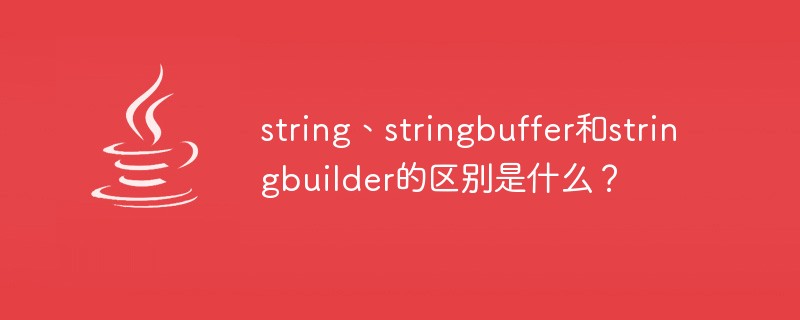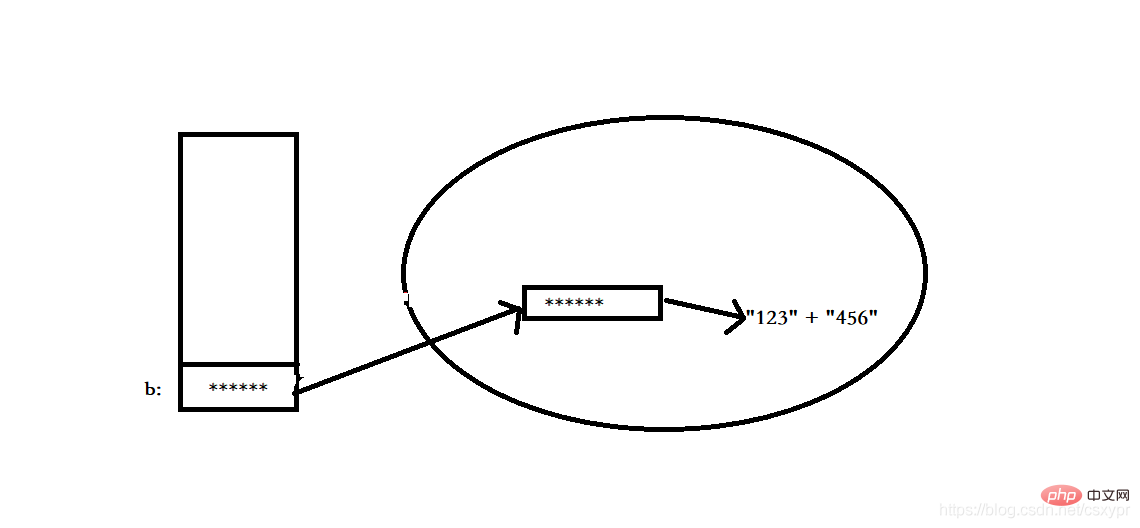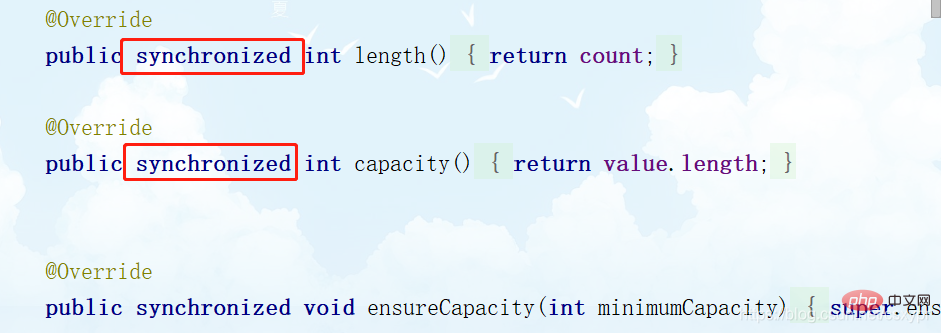What is the difference between string, stringbuffer and stringbuilder?
Difference: The String class is an immutable class. When a String object is created, the character sequence contained in the object is immutable until the object is destroyed; the StringBuffer object represents a mutable string object, and Thread-safe; the StringBuilder class represents mutable string objects and is not thread-safe.

##The difference between String, StringBuffer and StringBuilder:
String
The String class is an immutable class, that is, once a String object is created, the character sequence contained in the object cannot be changed until the object is destroyed. . This is an explanation of the String class. Xiao Xian'er saw this situation before and could not understand the above explanation, as followsString a = "123"; a = "456"; // 打印出来的a为456 System.out.println(a)
a object
StringBuffer## The StringBuffer object represents a string with a variable character sequence. When a StringBuffer is created, the append provided by StringBuffer (), insert(), reverse(), setCharAt(), setLength() and other methods can change the character sequence of this string object. Once the final desired string is generated through the StringBuffer, you can call its toString() method to convert it into a String object.
StringBuffer b = new StringBuffer("123");
b.append("456");
// b打印结果为:123456
System.out.println(b); Let’s take a look at the memory space diagram of the
b object: So the StringBuffer object is a string with a variable character sequence. An object is not regenerated, and new strings can be concatenated into the original object.
So the StringBuffer object is a string with a variable character sequence. An object is not regenerated, and new strings can be concatenated into the original object.
StringBuilder The StringBuilder class also represents mutable string objects. In fact, StringBuilder and StringBuffer are basically similar, and the constructors and methods of the two classes are also basically the same. The difference is:
StringBuffer is thread-safe, while StringBuilder does not implement thread-safety functions, so the performance is slightly higher.How does StringBuffer achieve thread safety?
Methods implemented in the StringBuffer class:
 Methods implemented in the StringBuilder class:
Methods implemented in the StringBuilder class:
 It can be seen that the
It can be seen that the
is added to the methods in the StringBuffer class, which means a lock is added to this method to ensure thread safety.
Improvements of Java9Java9 has improved the implementation of strings (including String, StringBuffer, and StringBuilder). Before Java 9, strings used char[] arrays to store characters, so each character in the string occupies 2 bytes; while in Java 9, strings used byte[] arrays plus an encoding-flag field to store characters, so strings Each character occupies only 1 byte. Therefore, Java9's strings are more space-saving, and the functional methods of strings are not affected.
For more programming-related knowledge, please visit:
Introduction to ProgrammingThe above is the detailed content of What is the difference between string, stringbuffer and stringbuilder?. For more information, please follow other related articles on the PHP Chinese website!

Hot AI Tools

Undresser.AI Undress
AI-powered app for creating realistic nude photos

AI Clothes Remover
Online AI tool for removing clothes from photos.

Undress AI Tool
Undress images for free

Clothoff.io
AI clothes remover

AI Hentai Generator
Generate AI Hentai for free.

Hot Article

Hot Tools

Notepad++7.3.1
Easy-to-use and free code editor

SublimeText3 Chinese version
Chinese version, very easy to use

Zend Studio 13.0.1
Powerful PHP integrated development environment

Dreamweaver CS6
Visual web development tools

SublimeText3 Mac version
God-level code editing software (SublimeText3)

Hot Topics
 1377
1377
 52
52
 Perfect Number in Java
Aug 30, 2024 pm 04:28 PM
Perfect Number in Java
Aug 30, 2024 pm 04:28 PM
Guide to Perfect Number in Java. Here we discuss the Definition, How to check Perfect number in Java?, examples with code implementation.
 Random Number Generator in Java
Aug 30, 2024 pm 04:27 PM
Random Number Generator in Java
Aug 30, 2024 pm 04:27 PM
Guide to Random Number Generator in Java. Here we discuss Functions in Java with examples and two different Generators with ther examples.
 Weka in Java
Aug 30, 2024 pm 04:28 PM
Weka in Java
Aug 30, 2024 pm 04:28 PM
Guide to Weka in Java. Here we discuss the Introduction, how to use weka java, the type of platform, and advantages with examples.
 Smith Number in Java
Aug 30, 2024 pm 04:28 PM
Smith Number in Java
Aug 30, 2024 pm 04:28 PM
Guide to Smith Number in Java. Here we discuss the Definition, How to check smith number in Java? example with code implementation.
 Java Spring Interview Questions
Aug 30, 2024 pm 04:29 PM
Java Spring Interview Questions
Aug 30, 2024 pm 04:29 PM
In this article, we have kept the most asked Java Spring Interview Questions with their detailed answers. So that you can crack the interview.
 Break or return from Java 8 stream forEach?
Feb 07, 2025 pm 12:09 PM
Break or return from Java 8 stream forEach?
Feb 07, 2025 pm 12:09 PM
Java 8 introduces the Stream API, providing a powerful and expressive way to process data collections. However, a common question when using Stream is: How to break or return from a forEach operation? Traditional loops allow for early interruption or return, but Stream's forEach method does not directly support this method. This article will explain the reasons and explore alternative methods for implementing premature termination in Stream processing systems. Further reading: Java Stream API improvements Understand Stream forEach The forEach method is a terminal operation that performs one operation on each element in the Stream. Its design intention is
 TimeStamp to Date in Java
Aug 30, 2024 pm 04:28 PM
TimeStamp to Date in Java
Aug 30, 2024 pm 04:28 PM
Guide to TimeStamp to Date in Java. Here we also discuss the introduction and how to convert timestamp to date in java along with examples.
 Create the Future: Java Programming for Absolute Beginners
Oct 13, 2024 pm 01:32 PM
Create the Future: Java Programming for Absolute Beginners
Oct 13, 2024 pm 01:32 PM
Java is a popular programming language that can be learned by both beginners and experienced developers. This tutorial starts with basic concepts and progresses through advanced topics. After installing the Java Development Kit, you can practice programming by creating a simple "Hello, World!" program. After you understand the code, use the command prompt to compile and run the program, and "Hello, World!" will be output on the console. Learning Java starts your programming journey, and as your mastery deepens, you can create more complex applications.




